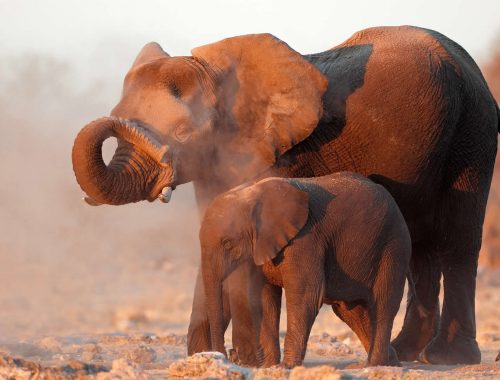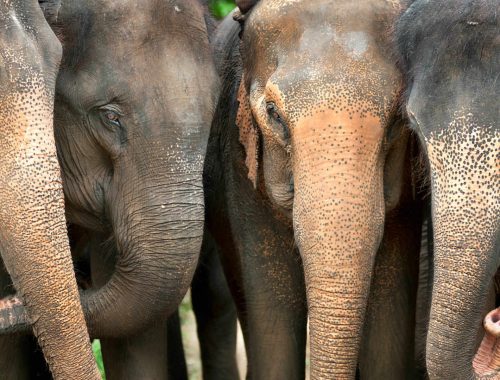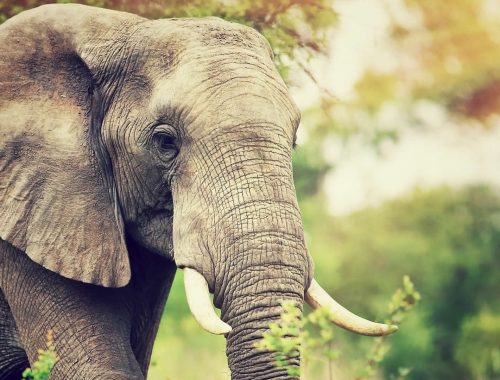Make your dream of working with elephants into a reality in one of the most beautiful countries in the world. Become part of an essential initiative to help elephants and communities live alongside each other, preserving the endangered Asian elephant for generations to come.
Duration: 1 – 12 weeks
Dates: Arrivals throughout the year
Arrival day: Sunday
Return day: Sunday
Eligibility: General level of fitness required. You will walk some steep inclines
Age: 17+
Share with friends...
Highlights
- The dramatic skies as the sun rises and sets over the reservoir and mountains
- Travelling by train and bus to the project site, passing through some of Sri Lanka’s most beautiful scenery
- Climbing up to the tree house viewing station to watch the elephants grazing peacefully
- Riding the elephant-friendly school bus, safely transporting children through the elephant grazing areas
- Involving yourself in local life, supporting the human and elephant communities
- Relax in the stunning infinity pool while gazing across an unspoilt, verdant landscape
- Add a conservation career course to support and apply for jobs after your trip
100 years ago, upwards of 20,000 elephants roamed the forests and grasslands of the beautiful island of Sri Lanka. Today, thanks to increased farming and habitat destruction, just 5,000 of these gentle giants live outside of captivity. The elephant, the symbol of Sri Lanka, is considered sacred – and this makes their decline all the more devastating.
You will be joining a multiple award-winning charity in their quest to encourage the survival of elephants living in the wild in Sri Lanka. You will be working with local scientists and conservationists to conduct research on a variety of elephant conservation projects. Alongside this conservation work you will have the privilege of witnessing elephants in the wild.
You will be getting very hands on with elephant research, observation and preservation in an effort to protect these majestic creatures for future generations. Sri Lanka is one of the top 25 most biodiverse countries in the world, and this project strives to maintain this delicate balance.
Your days will be varied and exciting, touching upon a variety of tasks:
- Monitoring the elephants and other wildlife in the area (keep an eye out for the elusive leopard!)
- Trekking through the jungle to follow the elephants’ grazing trail
- Identifying and photographing the elephants in the area
- Conducting research from a tree house overlooking the elephants’ traditional grazing ground
- Teaching environmental awareness to school children
- Working with locals to help improve their lives living alongside these elephants
- Carrying out mammal and bird surveys
The area in which you will be working is absolutely stunning. You will be trekking through mountains, jungles and wetlands to get to know intimately the lives of the elephants and what they are up to. On this journey you will come into contact with the friendly locals, swim in beautiful lakes and encounter some lush terrain. This is all part of what makes this project magical.
Are you looking for paid work in the conservation sector after volunteering or interning? Oyster have teamed up with our friends at Conservation Careers who support people to find paid work in conservation following study or a career change. You can add their fantastic and flexible course to your volunteering trip with Oyster. Your Oyster experience will help add interest to your conservation resume as an eye catching addition to your job applications in future!
Standard accommodation:
- Shared volunteer house with stunning views over Sri Lanka’s central forests and mountains
- Stunning infinity pool overlooking the vibrant landscape
- Located just outside a small village and within close proximity of the beautiful Wasgamuwa National Park
- The house is has basic yet comfortable facilities
- You will share a single sex bedroom with other volunteers
- Shared bathrooms with western toilets
- Shower water is heated by the sun, so is refreshingly cool after a hot day of elephant conservation projects
- No Wi-Fi at the volunteer house – we suggest taking an unlocked phone and buying a local SIM
- Fans, mosquito nets and bed linen provided
Upgraded private accommodation:
- Private rooms with ensuite bathrooms and aircon
- Just a few minutes walk from the station house – also with access to the beautiful pool!
- Capacity of up to three people per room
- £300 per room for one person, £400 for the room for two or three people sharing
- Meals are provided and are an excellent introduction to Sri Lankan food
- Breakfast can generally include toast, fresh fruits and the local staples of dhal, rice and curry
- Lunch and dinner include rice, dhal, curry and vegetables
- Most meals will be vegetarian with egg, fish and soy for protein
- Vegetarians and vegans can be catered for
- Safe drinking water provided
For only £320, we can organise a smooth and seamless trip for you from airport to project which is about 5 hours into heart of Sri Lanka.
We can organise an airport shuttle to come and collect you on your arrival to Colombo airport on Sunday. The driver will whisk you out of the bustling city to a beautiful old rest house built in 1822, about an hour away. This is the country’s oldest purpose-built hostelry. It was converted into a rest house in 1828 and comprises a single-story, seven room, Dutch-style bungalow with white circular columns. There is free Wi-Fi, restaurant and 24-hour room service with express check-in for guest’s convenience. After your long flight and a good night’s rest, our team will collect you in the morning and drive you approximately another 3 hours to your accommodation at the fieldhouse.
On the return, an airport shuttle will take you directly back to the airport – please arrange flights for the afternoon as this journey can take at least 4 hours.
Travel arrangements
Airport: Colombo (CMB)
Arrival day: Sunday
Departure day: Sunday
Included
- Access to your own personal ‘My Oyster’ account – our online portal where you can find out much more about the program and manage your booking
- Dedicated contact time with an experienced destination manager to discuss the project, answer any of your questions and for us to find out more about you
- Help and advice from our UK office before arrival and whilst you are away
- Pre-departure information covering medical, safety and project advice
- Gold level, 24/7 Pharos crisis management and incident support cover
- Financial protection: ATOL (if we book your flights).
- Thorough orientation on arrival
- In-country support
- Accommodation (see the ‘accommodation’ section above for details)
- Advice on visa requirements
- Oyster plants a tree in Africa with TreeAid to help reduce the impact of global carbon emissions
- Meals and soft drinks at the project site
On your return:
- Welcome home pack
- Certificate of Recognition (on request)
- References (on request)
Not Included
- Flights – as an ATOL bonded company, Oyster can book flights for you
- You need a valid passport that meets the requirements of the country you will be travelling to
- Insurance (covering your time with Oyster and any planned independent travel)
- Any costs associated with changing your return flight date if you need to
- Independent travel costs
- Home country travel costs
- Spending money for additional trips, food and entertainment
- Food costs when not at the project site
More Information
There are some people who find the idea of volunteering in a Sri Lanka elephant orphanage not quite what they are looking for. If working with elephants has always appealed to you, helping them to remain in the wild through this project can be an inspiring opportunity. This elephant project is conservation at its most poignant. Not only will you be doing something tangible and worthwhile, but you will be contributing to the long-term protection of endangered elephants.
Witnessing elephants almost every day quietly grazing, or splashing around in the waterholes, is something so special. This could be one of the last places in the world where you can see elephants living in the wild- and what a stunning wilderness it is too!
This project is a fantastic way to get conservation experience, all whilst playing the important role of helping with saving elephants!
Follow the link to learn why returned volunteer Natasha had a trip of lifetime.
Elephant conservation Sri Lanka.
With the rise of agriculture to support a growing population in this part of the world, the land in which the elephants can live freely has been dramatically reduced. Increasingly these elephants will venture into farmer’s land where they will wreak devastation by feeding on the crops. The work of 3 months can be undone by just one elephant in one night.
This volunteer project works hard to protect boundaries between humans and elephants to create a sustainable future for both species. In addition to this, huge importance is placed upon integrating humans and elephants, so that local communities will feel empowered and able to embrace their country’s icon once more. Without this volunteer project, the future of wild Asian elephants in Sri Lanka is not encouraging.
Whilst late-availability is possible, we would advise booking as soon as you can to guarantee your ideal dates. Our projects are very popular and spaces can fill up several months in advance, especially for the months of June to September.
Our Sri Lanka elephant volunteers come from a variety of different countries and backgrounds. Elephant conservation in Sri Lanka is possible for everyone, including but not limited to those doing:
- a gap year
- a career break
- family volunteering abroad
- a holiday with a difference
- conservation work experience
- a group trip
- a trip of a lifetime!
You can read Anne’s impressions from her first few days of volunteering here. It is important to know that you will not be an elephant sanctuary volunteer here – these elephants are wild, and we want them to stay that way!
You will be based in the central forests of Sri Lanka, where temperatures can range from a low of 14 degrees celsius in the wet season to highs of 34 degrees celsius in the dry season. On average, you should expect it to be about 25 – 32 degrees celsius with unexpected rain showers throughout the year.
As a general rule, you can expect the following:
- Rainy season: generally from October to January
- Summer season: generally from February to May
- Dry season: generally from June to September
- No specific skills or experience are required to volunteer in Sri Lanka.
- You do need to be prepared for the heat and high humidity of tropical jungles and be willing and able to walk up to 7km per day.
- All of these tasks are completed in the backdrop of forests, wetlands, woodlands, jungles and grasslands. Terrain will be varied and sometimes the days can be challenging physically.
- We simply ask that you are motivated, enthusiastic and adaptable.
Please be aware that whilst Sri Lanka is one of the most westernised countries in South Asia, there are many cultural etiquettes that you need to adhere to. To volunteer with elephants in Sri Lanka you should wear the following:
MALE: Knee-length shorts and trousers requested. T-shirts with high necks and short sleeves acceptable (no vests).
FEMALE: knee-length shorts, skirts and trousers requested. T-shirts must have high necks and short sleeves (no vests or spaghetti strap tops).
Please do not pack any clothes which do not fit in with these guidelines. Please do not bring clothes or kit in camouflage colours.
These are wild elephants and as such no interaction is allowed on this Sri Lanka elephant conservation programme. Oyster assesses projects carefully to ensure that they offer high standards of animal welfare and environmental practice. We also check that volunteers understand key points of good practice before working with animals. To find out more, see our animal welfare policy.
Volunteers should expect to spend around £30- 50 per week to include snacks, drinks and any trips.
You should make sure to take all of the money that you need with you, as there are no ATMs near the project site. There are not many opportunities to do any shopping whilst on the project site, so you should make sure that you have all that you need with you.
You will need to apply for a visa prior to departure. This is an easy process online and we will advise you on how to do this.
You need to make sure that your passport is valid for at least 6 months from when you arrive in Sri Lanka.
Most of our volunteers are independent travellers and you will become part of a group of people from around the world here. It is fine to travel with friends or as part of a small group too however- more the merrier!
The simple answer to this question is, yes absolutely!
It is important to bear in mind however that this may not be like other holidays that you have taken. Remember that you are volunteering, and this means that you will be put to work! This sort of holiday is a world away from sun loungers and cocktails, with our volunteers often heading home tired but immensely satisfied. If you think that you will need a bit of relaxing time on your trip too, do make sure to factor this in when your time on the project is complete.
The project is located in an area considered to be a malarial risk zone. You should consult your doctor or travel nurse on advice on what precautions to take. Your routine vaccinations will need to be up to date, it is likely you will need Hepatitis A and Typhoid, and possibly Hepatitis B and rabies. Please follow your doctor’s advice.
Check below for where the closest hospital to the project is – your doctor may ask to know this so that they can provide information on rabies.
For any more information, including entry requirements related to Covid-19, please see the Fit for Travel website or the UK government’s travel advice page for Sri Lanka.
The closest medical facilities are 20 minutes drive from the project site. There is also a local doctor living in the neighbouring village who can offer initial medical support and treatment for minor illnesses and injuries.
Sri Lanka is a small island, roughly the same size as the Republic of Ireland. Its people are known for their friendliness and delight at having visitors to their country. Don’t be surprised to receive lots of smiles and welcomes in the streets.
Colombo, the capital city of Sri Lanka, is a sprawling city that stretches along the coast. You will be based 2km from the coast in a small hotel with helpful and friendly staff. If your flight arrives early enough you might well have time to explore the city and if you do, you will be amazed by how friendly everyone is. Do watch out when you cross the road however, there seem to be cars coming from many angles!
The following day you will be collected from the hotel and taken to the train station. You will take the train along the beautiful journey to Kandy. Upon arrival in Kandy, you will be met and taken by bus up to the project.
The project house is in a beautiful valley close to the local village. Volunteer coordinators live on site and also will always be out in the field with you. Bearing in mind that you will be working around elephants during the day time, it is important that you listen to briefings on health and safety and follow these to the letter.
The project house is located in a small village about 4 hours from the city of Kandy. There are smaller villages closeby with limited shops for snacks and drinks.
There is access to wifi at a nominal fee at the project house, but it can be intermittent.
There is good phone reception here.
Sri Lanka time is 5 and a half hours ahead of GMT (GMT +5:30)
In Sri Lanka, a mixture of British plugs and Sri Lankan plugs are used.
There are several day trips that you can do in the vicinity, but most people simply like to explore the beautiful area around and relax in the jungle.
You should expect to have one day off per week.
Supervision will be fairly intensive during the first few days, when you will receive a thorough induction and work-related training. Once you are comfortable with things, you might not always have a supervisor working alongside you, but there will always be staff and other volunteers around to help, and you will always be accompanied for any high risk activities.
Staff at Oyster’s head office and in-country will be responsible for your safety and welfare while you are at the project. This will start from the moment you are picked up from the airport until the day that you leave the project at the end of your stay. Before and after these times, you will be outside Oyster’s responsibility and should make sure that you act safely and avoid risk. This is also true if you choose to leave the project during your time off. We will give you plenty of guidance and advice about this.
Please note, in contrast to your time on the project, whilst you are in Colombo you will not be under direct supervision. We expect you to make sensible choices and follow our advice on staying safe.
Oyster has personally hand-picked some of the best volunteering projects out there. With so much amazing choice, it can be hard to make a decision. Our Animal Welfare Destination Manager, Anne, has written a guide to help you to choose the best animal volunteering project for you.
If you would like to be a Sri Lanka elephant orphanage volunteer, this project is not the best one for you. We do have fantastic elephant sanctuaries in Thailand and Laos however, which are both quite hands-on with the elephants:
Other elephant conservation projects that you can consider are:
- Volunteer with elephants in Namibia – helping to keep desert elephants living in the wild
- Volunteer with elephants in South Africa – helping to research and care for elephants in the semi wild
Project Reviews
Read elephant volunteering reviews from Oyster participants from the fantastic Sri Lanka project:
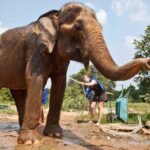 "I had such an incredible time in Sri Lanka, I didn't want to come home!! I met great people and learnt so much, it was truly amazing 🙂 Thank you for your help throughout."
"I had such an incredible time in Sri Lanka, I didn't want to come home!! I met great people and learnt so much, it was truly amazing 🙂 Thank you for your help throughout."
Beth, 2 weeks, August/September 2024
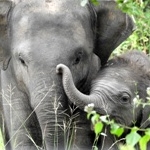 "This trip was really nice and the people so nice to my son and I. I want to thank you. And hope you can also let them know how wonderful it was. Hope Costa Rica will be as great as the people we met in Sri Lanka. The boss was such a kind person."
"This trip was really nice and the people so nice to my son and I. I want to thank you. And hope you can also let them know how wonderful it was. Hope Costa Rica will be as great as the people we met in Sri Lanka. The boss was such a kind person."
Isabelle and Lou...
Got a question or want to chat to Project Manager Kate who has first-hand experience of the project? Call +44 (0) 1892 771 973or email: – [email protected].
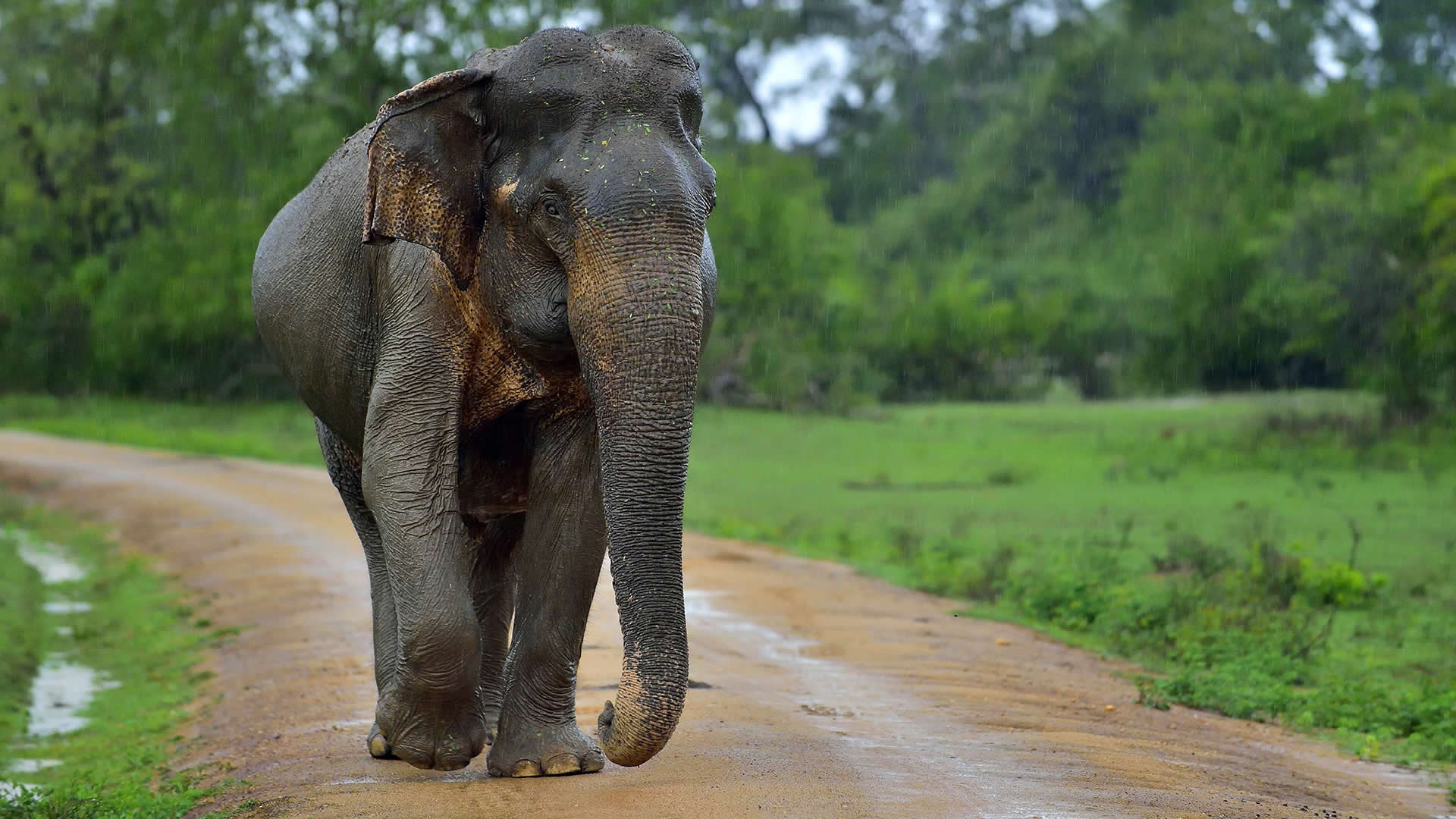









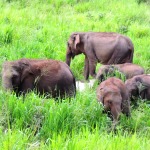 "Life here is lovely. Sri Lanka is so beautiful. Everyone here are so friendly. My stay so far has been with 3 other volunteers from different companies. We saw 25 elephants last Thursday at the national park, it was truly incredible. 😍😍 Our time is well balanced between conservation surveys, elephant observations and downtime to relax and read a book. I am feeling very peaceful and content here. All is great."
"Life here is lovely. Sri Lanka is so beautiful. Everyone here are so friendly. My stay so far has been with 3 other volunteers from different companies. We saw 25 elephants last Thursday at the national park, it was truly incredible. 😍😍 Our time is well balanced between conservation surveys, elephant observations and downtime to relax and read a book. I am feeling very peaceful and content here. All is great."
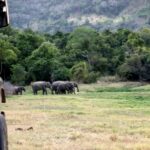 "My week here was both good fun and a great learning experience. I really enjoyed seeing the elephants at a national park and the butterflies on the butterfly survey walk. I learnt a lot about a way of life that I had never seen before and how Sri Lankan farmers are affected by the elephants. As a solo traveller to the project I was made to feel at home by all the friendly staff and volunteers. I also really enjoyed playing cricket with the locals."
"My week here was both good fun and a great learning experience. I really enjoyed seeing the elephants at a national park and the butterflies on the butterfly survey walk. I learnt a lot about a way of life that I had never seen before and how Sri Lankan farmers are affected by the elephants. As a solo traveller to the project I was made to feel at home by all the friendly staff and volunteers. I also really enjoyed playing cricket with the locals."
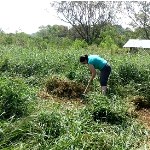 "I’ve felt very much part of the project here and the plight to improve human-elephant conflict through various activities. I think my favourite was working at the farm following a crop raid. There you can see a direct link and benefit to the farmer, with us clearing around the orange trees to allow them to grow and flourish."
"I’ve felt very much part of the project here and the plight to improve human-elephant conflict through various activities. I think my favourite was working at the farm following a crop raid. There you can see a direct link and benefit to the farmer, with us clearing around the orange trees to allow them to grow and flourish."
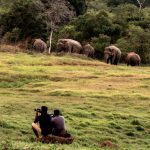 "We attended many activities that would help the people in the surrounding villages to avoid conflicts with elephants. We especially liked to join the surveys where we could ask the people directly how they live with elephants that still may come every night to their houses. It is interesting that they all still love elephants, despite all the destruction.
We also enjoyed all the friendly people of the project team who made us feel like in a big family!"
"We attended many activities that would help the people in the surrounding villages to avoid conflicts with elephants. We especially liked to join the surveys where we could ask the people directly how they live with elephants that still may come every night to their houses. It is interesting that they all still love elephants, despite all the destruction.
We also enjoyed all the friendly people of the project team who made us feel like in a big family!"
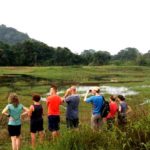 "Thank you so much for an incredible experience. We have learnt lots about your projects and all the good work you are doing here. Also will come away with much knowledge of wildlife and of course the elephants. Its has been the best magical experience to see them in their natural habitat…loved the tree house time. The staff and volunteers are all lovely…we will miss everyone!"
"Thank you so much for an incredible experience. We have learnt lots about your projects and all the good work you are doing here. Also will come away with much knowledge of wildlife and of course the elephants. Its has been the best magical experience to see them in their natural habitat…loved the tree house time. The staff and volunteers are all lovely…we will miss everyone!"
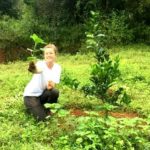 "This was our first experience in volunteer mission and we really enjoyed it! We learnt many things about the Sri Lankan culture, elephants and others animals. We met beautiful people and amazing staff. We really loved discovering the life of the people here and when we saw the elephants for the first time, it was a moment that we never forget! Thanks to everyone who make this experience beautiful!"
"This was our first experience in volunteer mission and we really enjoyed it! We learnt many things about the Sri Lankan culture, elephants and others animals. We met beautiful people and amazing staff. We really loved discovering the life of the people here and when we saw the elephants for the first time, it was a moment that we never forget! Thanks to everyone who make this experience beautiful!"
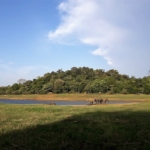 "Great adventure - so glad I did it! Obviously, observing the elephants in the wild was the biggest highlight, but it was also so interesting to learn about the results of their research and how they are putting strategies in place to help resolve the human elephant conflict."
"Great adventure - so glad I did it! Obviously, observing the elephants in the wild was the biggest highlight, but it was also so interesting to learn about the results of their research and how they are putting strategies in place to help resolve the human elephant conflict."
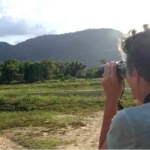 "What a wonderful adventure. Digging holes for orange trees, rebuilding homes, setting cameras, teaching English at the school and walking through streams looking for pug marks, waiting for the elephants in the tree hut and down by the water tank... Each staff member is kind, helpful, and willing to answer any and all questions.. I am grateful for my time spent here, the experience of sharing this time with others from around the world, and the challenges I faced and overcame"
"What a wonderful adventure. Digging holes for orange trees, rebuilding homes, setting cameras, teaching English at the school and walking through streams looking for pug marks, waiting for the elephants in the tree hut and down by the water tank... Each staff member is kind, helpful, and willing to answer any and all questions.. I am grateful for my time spent here, the experience of sharing this time with others from around the world, and the challenges I faced and overcame"
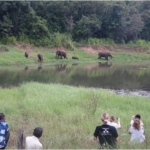 "The two weeks that I have had here have been hands down two of the best I've had. From inspecting dung all the way up to some truly magical experiences observing the elephants in the wild, I could not have asked for more from my time here. As a lifelong elephant-lover, to observe them in their natural environment was incredible. But I also feel I have learnt a lot about human elephant conflict and appreciate how vital resolving this is to the conservation of the creatures I hold so dear."
"The two weeks that I have had here have been hands down two of the best I've had. From inspecting dung all the way up to some truly magical experiences observing the elephants in the wild, I could not have asked for more from my time here. As a lifelong elephant-lover, to observe them in their natural environment was incredible. But I also feel I have learnt a lot about human elephant conflict and appreciate how vital resolving this is to the conservation of the creatures I hold so dear."
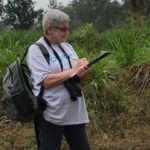 "I’ve enjoyed all the activities and learnt a lot both about elephants and Sri Lankan birds. The highlight of my stay was seeing 60 – 70 elephants including baby elephants and a fully grown splendid male. It’s a memory that will stay with me for a long long time. I’ve enjoyed meeting so many people from round the world and have been heartened by the passion for conservation of both volunteers and staff. It’s been a splendid trip!"
"I’ve enjoyed all the activities and learnt a lot both about elephants and Sri Lankan birds. The highlight of my stay was seeing 60 – 70 elephants including baby elephants and a fully grown splendid male. It’s a memory that will stay with me for a long long time. I’ve enjoyed meeting so many people from round the world and have been heartened by the passion for conservation of both volunteers and staff. It’s been a splendid trip!"
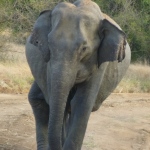 "There are no words for what I have experienced. Everything over there was much simpler and discovering the culture and the wildlife was something that I will treasure for the rest of my life!
Everything was very well organised. Arriving in a new country is always stressful but I felt like I knew that everything would work out and I knew what I was doing."
"There are no words for what I have experienced. Everything over there was much simpler and discovering the culture and the wildlife was something that I will treasure for the rest of my life!
Everything was very well organised. Arriving in a new country is always stressful but I felt like I knew that everything would work out and I knew what I was doing."
 "It was really great to meet like-minded people who care about animals and enjoy integrating themselves within new cultures. I loved seeing the elephants in the wild and talking to the local people about their experiences. I would really recommend it to people who are looking to travel alone for the first time as you meet people on the programme and can then organise trips with them at the weekend."
"It was really great to meet like-minded people who care about animals and enjoy integrating themselves within new cultures. I loved seeing the elephants in the wild and talking to the local people about their experiences. I would really recommend it to people who are looking to travel alone for the first time as you meet people on the programme and can then organise trips with them at the weekend."
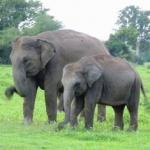 "It is very enlightening - you get to hear the community views about conflict with wildlife, and you get to collect data for scientific research."
"It is very enlightening - you get to hear the community views about conflict with wildlife, and you get to collect data for scientific research."
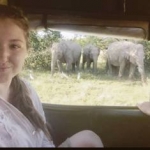 "My time in Sri Lanka was one of the most incredible experiences of my life! The people who work for the conservation project are absolutely wonderful, and I really enjoyed interacting with the other volunteers. Thanks for everything. I felt incredibly prepared and safe during my trip thanks to you guys! I would recommend you to anyone who is looking to volunteer."
"My time in Sri Lanka was one of the most incredible experiences of my life! The people who work for the conservation project are absolutely wonderful, and I really enjoyed interacting with the other volunteers. Thanks for everything. I felt incredibly prepared and safe during my trip thanks to you guys! I would recommend you to anyone who is looking to volunteer."
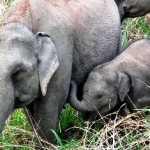 "This trip has been amazing and everything I hoped it would be. The organisation of transfers has been amazing. We have enjoyed the field work which is structured to the interests of the volunteers. The people here are lovely too! We have seen elephants on several occasions, and the magic of seeing them in their natural environment is an amazing unique experience! We have both praised Oyster's efficiency and support in making this trip possible, and will definitely be booking further adventures in the future."
"This trip has been amazing and everything I hoped it would be. The organisation of transfers has been amazing. We have enjoyed the field work which is structured to the interests of the volunteers. The people here are lovely too! We have seen elephants on several occasions, and the magic of seeing them in their natural environment is an amazing unique experience! We have both praised Oyster's efficiency and support in making this trip possible, and will definitely be booking further adventures in the future."
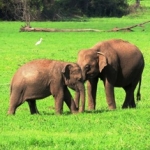 "I had an amazing time in Sri Lanka and I think the programme is great. All the people who work there are so friendly and there was a really laid-back atmosphere. I also met some really friendly volunteers. I'm so glad I found your website!"
"I had an amazing time in Sri Lanka and I think the programme is great. All the people who work there are so friendly and there was a really laid-back atmosphere. I also met some really friendly volunteers. I'm so glad I found your website!"
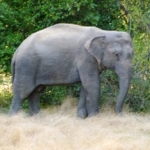 "I had a great time. Getting to see so many elephants up close and in the wild was amazing. Thanks for everything, you've been very helpful."
"I had a great time. Getting to see so many elephants up close and in the wild was amazing. Thanks for everything, you've been very helpful."
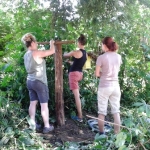 "Yesterday, I could see the nice lake with the sun rising - beautiful. Morning work was to build a beehive fence around a farmhouse and by midday we were ready with it. Just the bees are missing! In the afternoon, we were watching elephants at the dump, and we were lucky to see at last three different bulls. So you see, I'm having a great time here! Thank you for the good organisation and preparation for this project!"
"Yesterday, I could see the nice lake with the sun rising - beautiful. Morning work was to build a beehive fence around a farmhouse and by midday we were ready with it. Just the bees are missing! In the afternoon, we were watching elephants at the dump, and we were lucky to see at last three different bulls. So you see, I'm having a great time here! Thank you for the good organisation and preparation for this project!"
